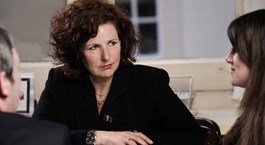Dean of Faculty introduces "Prosecute or Protect? Article 31 (1) of the 1951 Refugee Convention and the Criminal Justice System in Scotland"
22 May
Offering protection to people fleeing persecution may be difficult, but it must be done, the Dean of Faculty declared in opening a conference to raise awareness of an important piece of asylum legislation.
James Wolffe, QC, said that the duty on states to give asylum to those who faced a well-founded fear of persecution in their home country was a moral imperative as well as an obligation in international law.
"I do not underestimate the challenges today of meeting those moral and legal claims - we can see that exemplified by what is happening in the Mediterranean," stated Mr Wolffe.
"The displacement of populations by war and civil strife; the ease of international mobility; the potential difficulty of distinguishing the genuine refugee from the economic migrant or, indeed, from the person who would do us harm - all of these challenge our commitment to the protection of refugees.
"But we cannot fail to meet the claims of those who flee persecution just because it is difficult or inconvenient to do so."
The conference, "Prosecute or Protect? Article 31 (1) of the 1951 Refugee Convention and the Criminal Justice System in Scotland" was sponsored by the Faculty and arranged with the Scottish Refugee Council as part of its 30th anniversary celebrations.
Article 31 (1) means that, in stipulated circumstances, states should not prosecute refugees for illegally entering the country or for using false papers. Mr. Wolffe quoted a judge who had observed that: "Escapes from persecution have long been characterised by subterfuge and false papers."
Mr. Wolffe added: "To prosecute and punish genuine refugees for using subterfuge and false papers would, then, undermine the duty of protection which states owe to them."
The Lord Advocate, Frank Mulholland, QC, also spoke at the conference. He described how the Crown Office and Procurator Fiscal Service was developing a policy to address such cases and outlined the anticipated content of that policy.
Other speakers at the conference included Joe Bryce, Advocate, Yewa Holiday, of Queen Mary University, London, John Wilkes, Chief Executive of the Scottish Refugee Council, and Peter Grady, from the Office of the UK Representative of the UN High Commissioner for Refugees.
Mr Wolffe commented: "I am really pleased that the Faculty has been able to support the Scottish Refugee Council in raising awareness of this important feature of the law - which lies at the interface of criminal law and refugee law. I have the impression that it is not as well understood as it should be, and it was therefore very gratifying indeed that the conference attracted a large audience."
